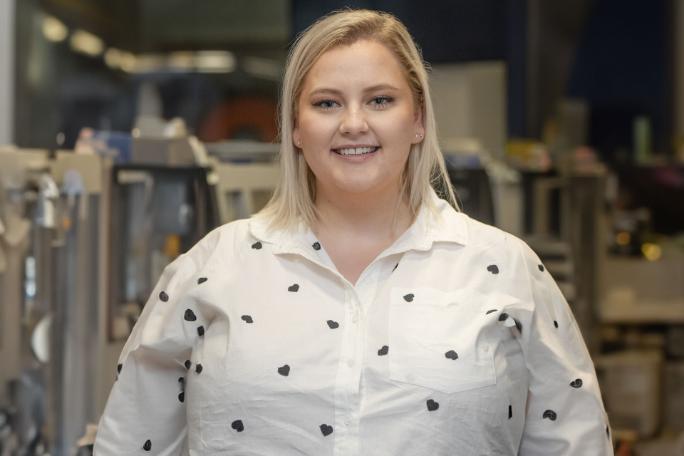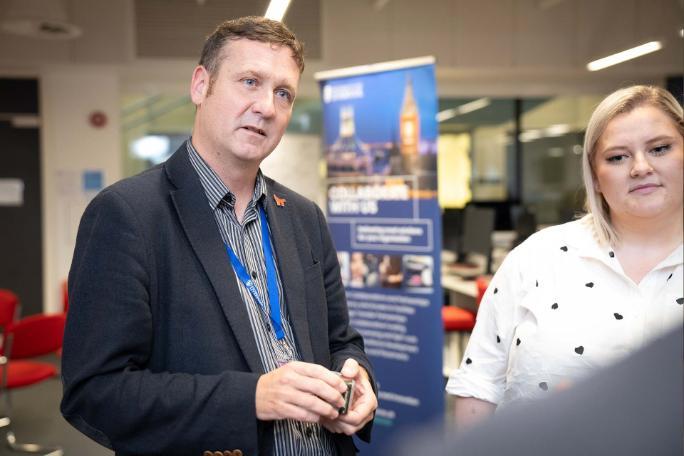Meet Nerys Davies
PhD student, Nerys Davies, is researching alternative materials for self-powered neutron detectors to reduce radioactive waste in nuclear power plants, with the aim of improving environmental and disposal practices.
- Name – Nerys Davies
- Position – PhD Student
- Group Name – Nuclear Physics
- Joined University of Liverpool – 2020
- Born – United Kingdom
- Prior degrees – BSc Physics with Medical Applications, University of Liverpool and MSc Radiometrics: Modelling and Instrumentation, University of Liverpool

What is your research about?
My research is based in the nuclear instrumentation section of the Nuclear Physics Group at Liverpool and is industrially sponsored by Sizewell C. I am conducting investigations into the technical feasibility of using a different material in self-powered neutron detectors. Self-powered neutron detectors are used in the core of nuclear power plants to measure the neutron flux in the reactor and hence measure the neutrons available for fission reactions and for ensuring a controlled chain reaction in the reactor.
Cobalt 59 is a material typically used in the detector but over time becomes highly radioactive as a result of neutron activation presenting challenges in terms of handling, processing and disposing of the radioactive material when they are replaced every 18 months or so. I am investigating the technical feasibility of an alternative material which would have a lower level of radioactivity and will have a shorter half-life, allowing it to be more easily handled and disposed of and thus not require long-term on-site storage or disposal in a geological disposal facility.
This research project promises great benefits for wider society as a result of less radioactive waste being produced, and hence disposed of, as well as creating many advantages for the environment and environmental disposal facilities.
🚀 The other week, we signed a Memorandum of Understanding with @LivUni and @LpoolCityRegion. This collaboration will facilitate research and innovation across Britain, investing in the future of nuclear knowledge.
— Sizewell C (@sizewellc) November 18, 2024
Hear more from @MetroMayorSteve along with two PhD students,… pic.twitter.com/MRYcBNrq7B
What or who first inspired you to be interested in your research subject?
Scientific research has always been prevalent during my life as both of my parents completed PhDs in chemistry. I have enjoyed science from a young age. When I began studying at university, I discovered a particular interest in the applied side of nuclear physics and the impacts on society
However, it was during my undergraduate final year project on the “design creation and characterisation of a breast tissue equivalent phantom for clinical use”, supervised by Dr Faye Wearing at Liverpool that I was first introduced to conducting my own independent research within the context of the wider scientific community. My project and many discussions with Dr Wearing gave me an insight into the world of research and the difference that can be made to the wider society through advances in scientific knowledge.
What techniques and equipment do you use to conduct your research?
A lot of the research I am conducting is experimental work - designing and hence analysing data from these experiments as well as modelling scenarios in simulation packages used for radiation detector development.
Which other subjects are important for your research?
There are many other important subjects for my research, many of which are being covered during my studies with the EPSRC funded SATURN (Skills and Training Underpinning a Renascence in Nuclear) CDT. These are subjects include: materials engineering to understand the structural integrity of materials, nuclear engineering to understand the entire nuclear fuel cycle from fuel production to spent nuclear fuel storage, and materials science to characterise materials through different techniques and evaluate their properties.

What impact is your research have outside of academia?
If successful, my research will provide an alternative material for use in self-powered neutron detectors in nuclear assemblies such as Sizewell C. The use of an alternative material would reduce the amount nuclear waste generated as the self-powered neutron detectors would not have to be replaced as often as the ones currently in use in nuclear power plants across the world. The waste that will be generated would also be in a lower radioactive waste category meaning it would not have to go through long-term on-site storage and hence disposal in a geological disposal facility. This would result in lower stockpiles of radioactive waste in geological disposal facilities, hence being beneficial for wider society and future generations.
What advice would you give to someone considering a career in research?
In my opinion a career in research is something that needs to be carefully considered. There is no knowing if your research project will end up being successful or not, which can be difficult. You have to be able to come to terms with the fact that there may not be an answer out there, as you will be working at the frontier of knowledge in your subject area, conducting brand new research. I am at the very early stage of my research career but have thus far had an extremely positive experience. As well as learning about many subjects through the SATURN CDT which I would not have had to chance to otherwise, I have also been on multiple trips and had hands on experience with experimental techniques I would not have got otherwise. One of the big benefits is that I have met a lot of very interesting people from a wide range different scientific backgrounds, such as biology, engineering and chemistry through the SATURN CDT programme who I would have never met otherwise. It is very exciting to be working in such an interdisciplinary group of people in which we all help each other out.
My research will provide an alternative material for use in self-powered neutron detectors in nuclear assemblies such as Sizewell C